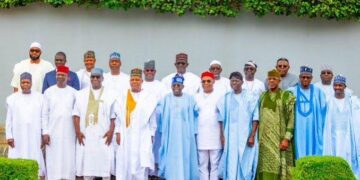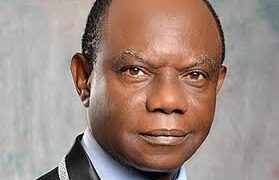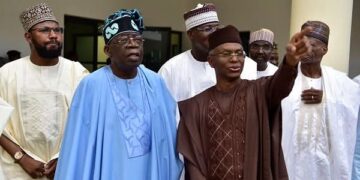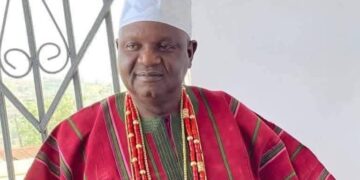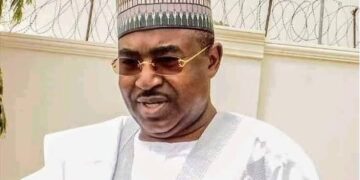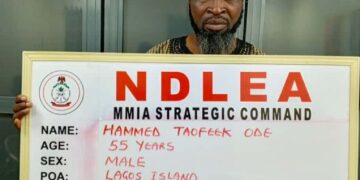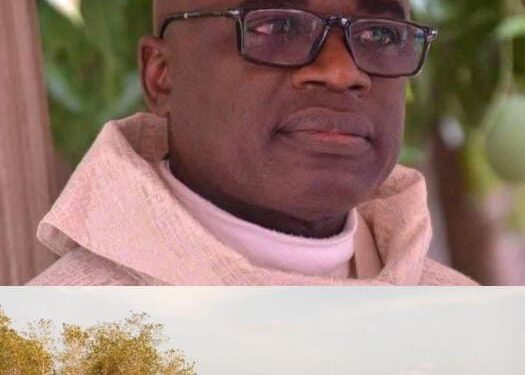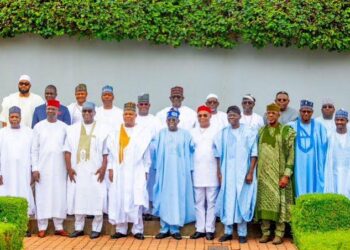The Benue State Universal Basic Education Board (SUBEB) recently recruited more than 9,000 primary school teachers, after the state government allocated about 15 per cent of its 2025 budget to education.
However, a PREMIUM TIMES tour of primary schools across the state has revealed that many schools lack structures, classrooms and active teaching staff.
Visits to schools in Logo, Ukum, and Ogbadibo Local Government Areas of the state showed that the promise of improved education has not translated into reality for thousands of children in rural communities.
In Logo Local Government, NKST Primary School, Pagher does not have any building. The school, established in 1976, operated for over four decades in a makeshift church structure that collapsed in 2024.
When PREMIUM TIMES visited, not a single class was in session, as the pupils had been told to remain at home.
LGEA Primary School Abiem, Aterayange Ward, Torov, Ukum LGA
Commenting on the development, Gregory Jigba said the pupils stopped coming due to a lack of shelter to hold classes.
Mr Jigba, the only government teacher at the school and its head for more than six years, said the school has not had a proper building since 1999, when the church building that doubled as classrooms collapsed.
“I cannot gather the pupils anymore. There is no shelter,” he said, urging the government to intervene so the children can return to school.
A parent, Kaanan Toryina, said he was forced to withdraw his six children from school.
“This school is the heart of our community. Without it, there is no hope. I cannot afford to send them to private school,” he said.
Another resident of Pagher community, John Peva, added that the new recruitment exercise brought no change.
“No single teacher was posted here, even if they post one, there is no classroom, no desk, not even a roof. How can children learn under such conditions this raining season?”
The story was not different at LGEA Primary School, Abeda-Shitile, Logo LGA. PREMIUM TIMES observed that the only block of classrooms had no roof, and learned that it was blown away a year ago, leaving pupils stranded.
LGEA Primary School Abeda-Shitile, Logo LGA
When the reporter arrived, the children were sat on dusty floors inside a temporary shed with no desks or teaching materials.
Saater Uchigh, a parent at Abeda community, said he enrolled his children in a private school due to lack of teachers and structures.
“I spend more than half of my income on fees alone. Feeding has become a struggle for my family. But what option do I have? If I leave them here, they will not learn anything,” Mr Saater said.
At LGEA Primary School, Abiem in Aterayange Ward, Torov, Ukum Local Government Area, pupils attended classes under a hut made of grass and wooden poles.
The makeshift classroom leaves children exposed to rain, scorching heat, and wind. Inside, there were no solid walls, no desks, and almost no facilities to support proper teaching and learning.
A community member, Abur Torhile, told PREMIUM TIMES that without urgent intervention, the future of their children is at risk.
“When children are left without classrooms and teachers, they turn to the streets,” he said. “That is how they get recruited into armed groups. The insecurity we are facing today is because government has failed to build schools for the less privileged.”
Mr Abur called on the government to provide proper classrooms, learning materials, and basic amenities.
When PREMIUM TIMES visited Ogbadibo Local Government Area, the situation was even more shocking.
LGEA Primary School Adaburu, Ogbadibo LGA
In communities such as Ajule, Ugbugbu, Eke-Apka, Aha-Ogbo, Ikpochi, and Udaburu, the public schools visited by the reporter were either deserted.
At LGEA Primary School, Ugbugbu, the classrooms were littered with droppings and crawling with lizards.
LGEA Primary School Ugbudu, Ogbadibo LGA
At LGEA Primary School Ikpochi, Itanono, collapsed school structures stood in silence with no single teacher or pupil in sight.
Agada Godwim, a father in Ugbugbu community, said his three children stopped attending the public school.
“It is not a school anymore. There are no teachers, no furniture, and the buildings are falling down. How can I keep my children there? I tried private school, but the fees have taken over my life. Every kobo I make goes into paying fees, and still I cannot afford the textbooks,” he said.
Ene Silas, a 41-year-old mother in Ajule, said she withdrew her daughter from a private school because she could no longer sustain the cost.
“I borrowed money for the last two terms. By this September resumption, I could not continue. She has been at home since the school has resumed. Government promised new teachers, but we have not seen any change in this community,” she said.
Agbo Samuel, a community leader in Ikpochi, recalled that the school once had more than 100 pupils. “Today, the classrooms are empty. The children are gone, and the teachers are not coming. Government says it has recruited thousands of teachers, but here, there is nothing to show,” he said.
Governor Hyacinth Alia recently announced that education would receive one of the largest allocations in the 2025 budget.
Out of the N550.1 billion budget presented to the Benue State House of Assembly, N82.5 billion was earmarked for education and knowledge management, representing about 15 per cent of the total budget.
This was more than double the N33.8 billion allocated to education in 2024.
However, the United Nations Educational, Scientific and Cultural Organization (UNESCO) recommends that governments allocate at least 20 per cent of their budgets to education in order to meet the global target for universal access.
While the new allocation to education is a significant increase, it still falls short of the benchmark.
More importantly, parents and teachers interviewed said the problem was not only about funding but also about implementation.
“We hear figures every year, but what difference does it make to us?” asked a teacher in Ogbadibo. “Our children are still without classrooms. We still teach under trees, and some schools are just abandoned altogether.”
PREMIUM TIMES’ findings show that while Benue State has committed more money and hired more teachers on paper, teachers and the basic infrastructure for learning are missing in many communities across the state.
Stephen Imanche, a father in Ogbadibo, summed up the situation: “Government schools are dead here. If you cannot pay private school fees, your child will not go to school. That is the truth. Recruitment of teachers does not mean anything if there is no school for them to teach.”
LGEA Primary School Eke-Apka, Ogbadibo LGA
PREMIUM TIMES (September 18, 2025).
https://www.premiumtimesng.com/regional/north-central/821902-benue-government-recruits-teachers-to-non-existent-schools.html

